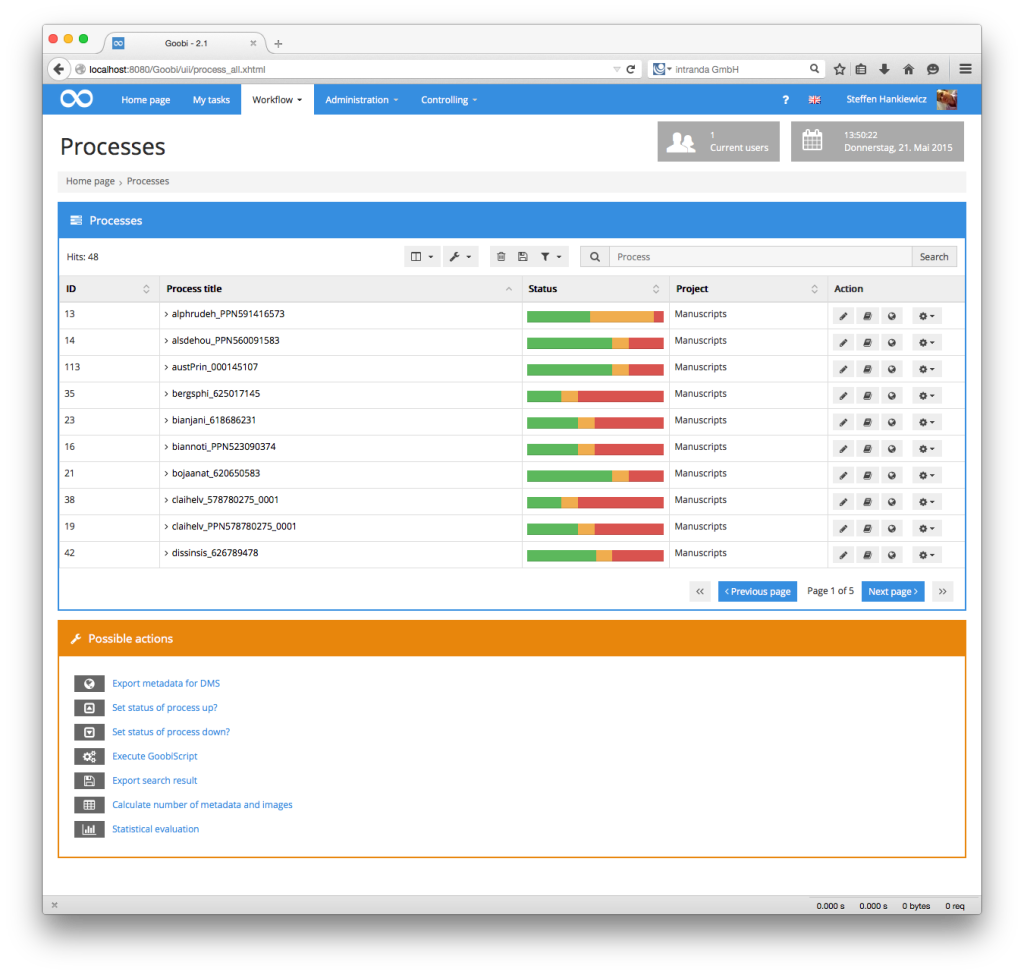Goobi: Überblick über die Funktionen
What is Goobi?
Goobi is an open-source software application for digitisation projects. It allows you to model, manage and supervise freely definable production processes and is used on a daily basis by many institutions to handle all the steps involved in creating a digital library. These include importing data from library catalogues, scanning and content-based indexing and the digital presentation and delivery of results in popular standardised formats – from book to online presentation
Many libraries, museums, archives, publishers and even scanning companies in Europe have already adopted the software. We’d like to invite you, too, to join the growing Goobi user community.
Helping you to run and make a success of Goobi
- Continuous software improvements and new features.
- Individually designed Goobi plugins to match your specific methodology.
- We can adapt Goobi to your particular requirements.
- We can give you a detailed insight into the program’s functionality.
- Advice on the hardware best suited to your needs.
- We can install Goobi on your systems or as a hosted system on the intranda cloud.
- Training for you and your staff either at your own premises or at our training centre.
- We can ensure that your results comply with international and DFG standards.
- We can configure and advise on every single aspect of your Goobi installation.
- Fast and professional support – guaranteed!
Who is behind the development of Goobi?
Over the first four years (2004-2008), Goobi’s development was led by Göttingen State and University Library. Since then, the software has been continuously developed by intranda in collaboration with the Goobi Community. intranda provides first- and second-level support at numerous sites. Goobi is covered by the GPL open-source licence.
Who uses Goobi?
As you would expect, since Goobi is a German software project, its use is most widespread in Germany. Apart from museums and archives, its main area of application is in university libraries. The digitisation programmes involved vary in size from quite modest projects at smaller institutions to large-scale digitisation at major Germany university libraries. Since 2008, interest in Goobi has also grown strongly outside Germany. Thanks to its tremendous flexibility and systematic multilingual design, Goobi is now in regular and productive use coordinating digitisation project workflows at a number of centres outside Germany (e.g. Austria, the UK, Spain, Switzerland, Netherlands, Denmark, Rwanda, Israel and the USA).
How can Goobi boost your productivity?
The task of organising individual and complex digitisation workflows places extremely high and varying demands on the software. The approach followed by Goobi allows you to incorporate an enormous range of site-specific factors. On the basis of the workflows compiled at the beginning of the project, you can ensure that all the texts you wish to digitise follow the same workflow. This means that each process can be specified in advance and guarantees that your output meets defined quality standards. An intuitive user interface allows the project manager to specify each step of the project and to integrate mandatory testing routines into the workflow with a view to validating the results of each step as quickly as possible. This avoids time-consuming correction loops and a considerable manual effort. Goobi also lets you automate repetitive manual tasks for greater consistency and accuracy. As a result, each volume can pass through the entire workflow much more rapidly than is the case using manual digitisation techniques.
Goobi in detail
As it has been designed principally for use in libraries, Goobi has to meet enormously varied requirements while remaining as user-friendly as possible. It also needs to allow for simultaneous multiple use at a number of centres. As a multilingual web-based application, Goobi meets all these requirements. The following pages provide a detailed description of Goobi’s functions and how they can help you coordinate your digitisation projects in a clear and organised way. Feel free to contact us if you have any questions. We will be delighted to explain everything in detail and at your own pace.
Goobi
Latest Release Notes
System requirements
| Operating system: | Linux |
| RAM: | 4 GB |
| CPU: | 4 cores |
| Hard disk: | 40 GB for operating system plus required data storage |
Get the software
| Source code: | GitHub Repository |
| Documentation: | Goobi workflow Manual |
| Installation: | On request |




Comments are closed.